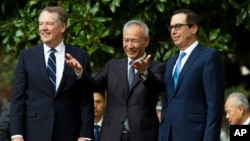VOA's Mandarin Service contributed to this report.
Senior negotiators from the U.S. and China sit down Thursday for another round of trade talks in an atmosphere of uncertainty about the likely outcome.
Over the past week, rhetoric and action from both sides seemed to make the chance of any substantive progress in resolving the punishing trade war appear slim.
Early Thursday though, after expressing ambivalence about the end results of the negotiations, President Donald Trump made a surprise announcement via Twitter that he and Chinese Vice Premier Liu He would be meeting at the White House on Friday.
The tweet, sent about 20 minutes after the financial markets opened, read, “Big day of negotiations with China. They want to make a deal, but do I? I meet with the Vice Premier tomorrow at The White House.”
The prospect of the meeting sent the stock market zooming upward, as it was interpreted as a sign that a deal might be closer than anyone had expected. As of mid-morning on Thursday, though, Trump’s tweet was the only indication that talks most expected to bear little fruit, might be more promising than previously believed.
Expectations had been low
Today’s resumption of talks will take place with the clock ticking down toward a further increase in U.S. tariffs on Chinese imports. A current 25 percent levy on $250 billion of Chinese goods is set to rise to 30 percent on Oct. 15, and a second set of taxes of 15% on more than $150 billion in goods is set to go into place on December 15. China has signaled that, should the U.S. follow through on those increases, it would retaliate in kind.
The trade war has cost American consumers tens of billions of dollars in tariffs, much of which the administration is funneling into aid for farmers, who have been most affected by the disruption of long-established trade relationships. Experts say it is difficult to gauge precisely how damaging the fight has been to China, but that country’s slowing economic growth seems to be partly attributable to the trade fight.
The global impact is even more significant. In a report issued this week, the International Monetary Fund estimated that the US-China trade war could take a $700 billion bite out of the global economy by the end of next year -- the equivalent of removing the entire output of Switzerland from worldwide commerce.
Experts watching the negotiations unfold in Washington said that while some progress might be made over the next day or two, it is likely to be incremental in nature, with the postponement of scheduled tariff increases looking like the best-case scenario.
“Nobody’s expecting a big deal,” said Gary Hufbauer, a senior fellow at the Peterson Institute for International Economics. He said a more likely outcome is a set of “modest steps” in which the US postpones the tariff increases, or lifts sanctions on specific Chinese firms like telecommunications giant Huawei, in exchange for symbolic increases in Chinese purchases of U.S. agricultural exports, like soybeans, wheat, and pork.
William Reinsch, Senior Advisor and Scholl Chair in International Business, Center for Strategic & International Studies agreed that larger US demands, including major revisions to Chinese business practices in areas like intellectual property and large economic subsidies to state-owned businesses, aren’t likely to be addressed.
“What [President Donald Trump] wants them to do...would basically turn their market into a western market economy,” Reinsch said. “[Chinese President] Xi Jinping has been going in the opposite direction.”
Late Wednesday night, U.S. officials began floating the possibility that the administration would suspend the October 15 tariff increase in exchange for China agreeing to a currency pact that would commit China to accepting a market-based exchange rate and refraining from competitive currency devaluation. As of Thursday morning, there had been no official response to that gambit from the Chinese.
Trump: ‘China wants to make a deal more than I do’
Even as the Chinese Vice Premier made the rounds in Washington on Wednesday, meeting with officials from the International Monetary Fund, Trump expressed ambivalence about the high-level talks.
In a meeting with reporters Wednesday, Trump said, “China wants to make a deal more than I do,” and reiterated his claim that tariffs he has unilaterally imposed on Chinese goods, which are paid by U.S. companies importing them, are a benefit to the United States.
“Look, I'm very happy right now, were taking in billions of dollars of tariffs,” he said. “They want to make a deal. The question is do I want to make a deal? The answer would be if we make the right deal I'd love to do it. I think it would be a great thing for China also.”
He also said that he would not sign off on a deal in which the benefits are evenly distributed. “It can’t be a 50-50 deal,” he said. “This has to be a better deal for us.”
For its part, China has also been actively lowering expectations. An editorial in the Communist Party-run Global Times newspaper this week said, “There are obviously many trade differences between the two countries, the attitude of the U.S. is not sincere, the area of conflict is growing broader, and strategic mutual distrust is increasing.”
Complicating factors
By themselves, comments like those from leaders on both sides might have been enough to derail the talks, which will be the 13th round in the current series. But with Liu preparing to sit down with U.S. Trade Representative Robert Lighthizer and Treasury Secretary Steven Mnuchin Thursday, the issues complicating negotiations are proliferating so quickly that it is difficult to keep track of them.
On Monday, the United States added 28 Chinese companies to the Commerce Department’s “Entity List,” which effectively bars U.S. companies from doing business with them. The companies affected are all involved in the Chinese government’s brutal suppression of the Uighur ethnic minority in its western Xinjiang Province, and include eight high-tech firms that do considerable global business.
On Tuesday, the State Department announced new restrictions on visas issued to senior Chinese officials, again tying the action to the repression of Uighurs in Xinjiang. Commerce Secretary Wilbur Ross followed up on Wednesday with a speech blasting Chinese trade practices, saying, “China has refused to change its behavior. In fact, its global trade practices have only gotten worse.”
China disparaged the Trump administration’s moves as an attempt to increase US leverage in advance of the talks. “No matter how many bargaining chips the U.S. adds to the trade war, China is prepared for them,” state media declared.
NBA and impeachment
Aside from the inter-governmental back-and-forth, there are other issues complicating the talks.
A single tweet last Friday from the general manager of a National Basketball Association’s Houston Rockets, in which he expressed support for pro-Democracy protesters in Hong Kong, snowballed over the course of several days, eventually resulting in China banning the broadcast of any NBA games to the hundreds of millions of fans of the sport in China. Additionally, all 11 of the league’s official Chinese partners announced a suspension of their relationships with the league as of Wednesday.
Muddying the waters even more is the ongoing effort by Democrats to impeach President Trump, which has been gaining momentum both in the House of Representatives and among the public at large, according to the latest polling. However, it remains to be seen just how much Trump’s impeachment problems will affect China’s willingness to strike a major deal with him, as the 2020 presidential election is now just under 13 months away.

